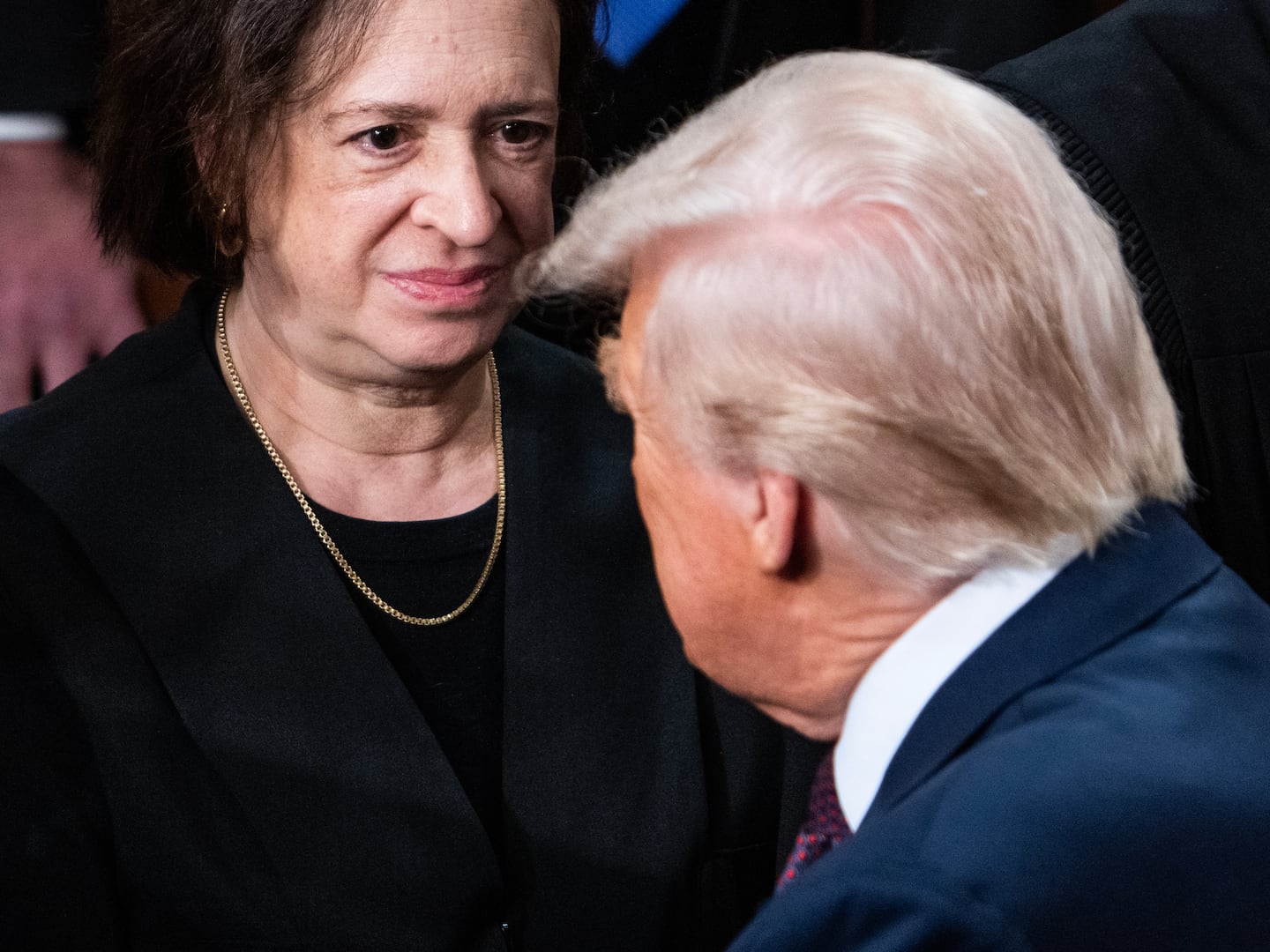In 2012, a 28-year-old American woman, Caitlin Coleman, was abducted along with her husband, Joshua Boyle, while traveling in Afghanistan. Coleman was pregnant and gave birth while in captivity. The family has been held ever since by the Taliban, and efforts to win their release have so far failed, U.S. officials told The Daily Beast.
Their plight—only occasionally mentioned in the Western press—was given fresh urgency Thursday when the U.S. government revealed that a CIA drone accidentally killed two hostages in Pakistan while targeting an al Qaeda meeting.
The couple were seen last year in a pair of videos pleading for their governments to help them. U.S. officials, speaking on condition of anonymity to discuss the case, have said that they don’t believe the three hostages’ lives are in immediate danger, unlike those Americans who were held hostage and eventually executed by ISIS.
Nevertheless, with the administration acknowledging Thursday that a U.S. drone strike in Pakistan accidentally killed American contractor Warren Weinstein, who’d been kidnapped in August 2011, the number of Americans held hostage is dwindling and pressure is building on the White House to fix a lumbering bureaucracy that has proven almost entirely incapable of rescuing American citizens.
Coleman and her husband met on the Internet in 2011 and soon married. The couple’s family told the Associated Press that they spent months traveling in Latin America, living among indigenous Guatemalans. Boyle grew his beard out, and some children began calling him Santa Claus.
“They really and truly believed that if people were loved and treated with respect that that would be given back to them in kind,” Linda Boyle, Boyle’s mother, told the AP. “So as odd it as it may seem to us that they were there, they truly believed with all their heart that if they treated people properly, they would be treated properly.”
The couple decided to set off for a more challenging adventure in the summer of 2012, going from Russia through several Central Asian countries and then into Afghanistan. Coleman was pregnant, and the couple planned to return from abroad before they gave birth. In emails to their family, Coleman and Boyle, who’s Canadian, said they understood they were heading into dangerous areas.
The couple’s communications ended in early October 2012, and their bank accounts were cleaned out. Initial reports speculated that since there’d been no demand for ransom or claim of responsibility by a terrorist group, the couple may have been killed. Boyle had previously been married to the sister of Omar Khadr, a Canadian who’d spent 10 years as a prisoner in Guantanamo Bay, Cuba. But officials said there is no connection between that previous relationship and Boyle and Coleman’s captivity.

Coleman’s father, James, has made impassioned pleas to whomever might be holding his daughter, asking them to free her, his son-in-law, and his grandchild. He said the couple may have gone into Afghanistan to help aid workers, describing his daughter as both “naive” and “adventuresome.”
When Coleman disappeared, her father said she was suffering from a liver ailment and that she required medical care. Her current health status is unclear.
Coleman and Boyle’s case hasn’t attracted the same level of media attention as those of some other Americans held prisoner, such as Weinstein and an Italian man, Giovanni Lo Porto, who was also killed in the U.S. drone strike. But there have been promising signs that the couple and their child might be freed through negotiations with the Taliban or intermediaries.
The videos that appeared last year were first emailed to Coleman’s father by a source who claimed to have connections to the Taliban. Hostage negotiations experts have told The Daily Beast that these so-called proof-of-life videos are a customary first step in opening negotiations.
Whoever sent the video had good reason to think the U.S. might be in a bargaining mood. Their arrival coincided with the release by the Taliban-linked Haqqani network of Sergeant Bowe Bergdahl, in exchange for five senior Taliban fighters who’d been held in Guantanamo Bay.
The Bergdahl swap, which President Obama authorized, appears to have encouraged Coleman and Boyle’s captors that some kind of trade could also be worked out for them and their child. And behind the scenes, a small group of U.S. officials was working to find a solution that would bring them home, along with all Westerners held in the Afghanistan-Pakistan region.
In the lead-up to the Bergdahl trade, a Pentagon unit headed by Lieutenant Colonel Jason Amerine, a decorated combat veteran who fought in the invasion of Afghanistan after the 9/11 attacks, was attempting to work out a prisoner swap that would bring back the hostages back. But the plans never materialized, nor do they appear to have been briefed to any senior officials outside the Pentagon. Instead, the CIA, the military, and the White House moved forward with a plan to trade for Bergdahl. The administration justified that swap under what it says are long-standing traditions to exchange military prisoners in times of war. But the trade has sparked outrage among hostage families, who say their loved ones are being treated differently because they won’t wear a military uniform.
“Due to infighting and disagreements among lead organizations, Amerine and his team struggled to get attention beyond the walls of the Pentagon and were ultimately sidelined,” Representative Duncan Hunter, a frequent critic of the Obama administration’s hostage rescue policies, said in a statement Thursday, revealing Amerine as the man in charge of the Pentagon cell.
Hunter said that when the administration chose to trade the five Taliban fighters for Bergdahl, “the deck was reshuffled for all the other Americans in captivity in the Afghanistan/Pakistan region. This is just one more failure in a string failures related to the Administration’s decisions and efforts related to Bergdahl’s release.”
Taliban sources tell The Daily Beast that more recently, efforts have been underway to free Americans held by the Taliban. Up until mid-March, the United States was “seeking Taliban intervention and help to get back U.S. hostages” held by the group in Afghanistan and Pakistan, as well as by al Qaeda, according to a Taliban source who spoke on condition of anonymity. The source didn’t mention Coleman or Boyle specifically.
The Taliban source claimed that U.S. officials told the Taliban and the government of Qatar that they’d be grateful for “any help” bringing American hostages home.
U.S. officials have insisted that they will not negotiate with terrorist groups for hostages’ release, a rule that White House Press Secretary Josh Earnest repeated Thursday while apologizing for the drone strike that killed Weinstein and Lo Porto.
However, the Qatari government has proven useful in securing the release of at least one American hostage, Peter Theo Curtis, who was held by al Qaeda’s branch in Syria and set free last year.
Two sources familiar with efforts to free Curtis told The Daily Beast that Qatar arranged for money to be paid to the al Qaeda branch, effectively a ransom. A third source denied that the money was a direct ransom payment, but said that Qatari officials had helped negotiate with al Qaeda in Syria to win Curtis’s release. What the militants may have received in return, this person declined to say. But Curtis and his family specifically thanked Qatar for its efforts after he was released.
It’s that kind of willingness to use intermediaries, rather than trying to run hostage negotiations solely out of the U.S. government, that critics of the Obama administration's hostage rescue policy have said they want to see brought to bear for Coleman and others still in captivity.
“Warren Weinstein did not have to die,” Hunter, said Thursday, referring to the American killed in the drone strike. “His death is further evidence of the failures in communication and coordination between government agencies tasked with recovering Americans in captivity—and the fact that he’s dead, as a result, is absolutely tragic.”
Weinstein’s wife, Elaine, issued a statement on behalf of her family praising their members of Congress and FBI agents for their “relentless” efforts to bring Warren home after he was kidnapped. “Unfortunately, the assistance we received from other elements of the U.S. Government was inconsistent and disappointing over the course of three and a half years,” she said, in an apparent reference to the intelligence community. “We hope that my husband’s death and the others who have faced similar tragedies in recent months will finally prompt the U.S. Government to take its responsibilities seriously and establish a coordinated and consistent approach to supporting hostages and their families.”
Hunter blamed the failure to rescue Weinstein on conflicting missions at the FBI, which is in charge of cases of Americans held hostages overseas, and the CIA, whose “focus in this case and others is not on the successful recovery of Americans held captive. Above all, this incident reaffirms the necessity to install an interagency coordinator in order to ensure there’s effective and constructive engagement at all levels.”
—with additional reporting by Sami Yousafzai






